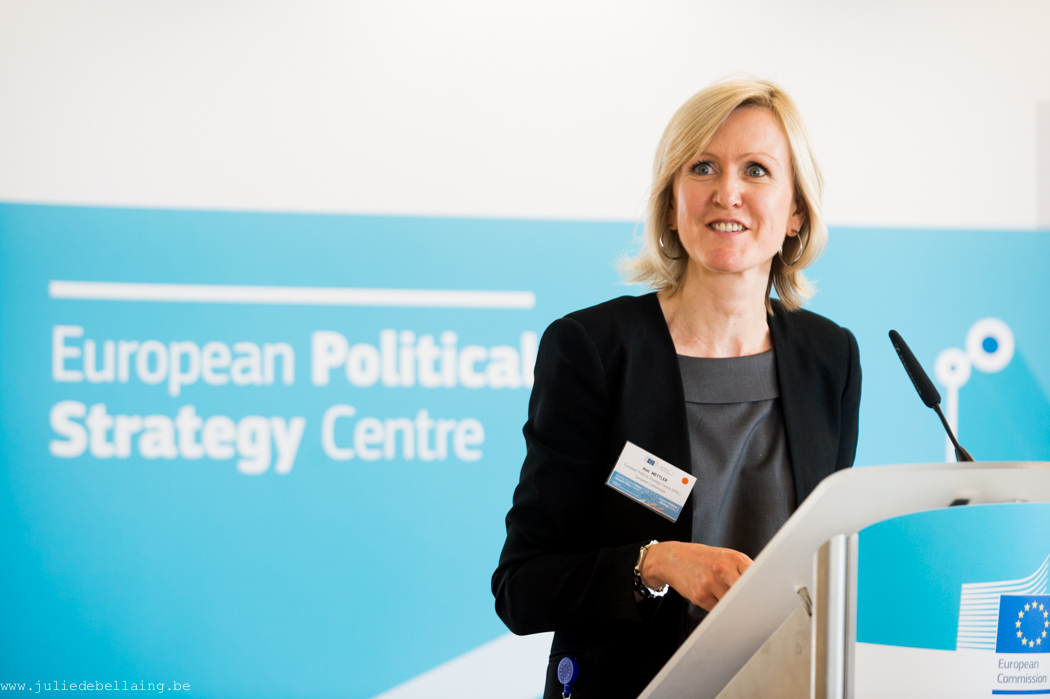Interview with Ann Mettler

Related topics
Retail financial servicesdate: 28/03/2017
The emergence of new technologies is profoundly reshaping the structure of the financial sector. How do you see the role of FinTech in the future development of the digital single market?
FinTech shows major potential for helping us achieve two of the main goals set by the Juncker Commission: improving access to finance for start-ups, SMEs and retail clients; and achieving more inclusive growth. Start-ups are getting lots of press nowadays, and with good reason: they contribute disproportionately to job creation, with young firms generating as many as 42% of new jobs.
Helping these companies to raise capital is hence central to creating more jobs and growth. And, thanks to innovations such as data analytics, artificial intelligence and distributed ledger technology – to name just a few – FinTech can open up new pathways to additional sources of finance. This is not just conjecture: In 2015 alone, crowdfunding platforms raised roughly 4.2 billion euro. This is a trend that is well worth our support and the EU must do everything it can to ensure that these new sources of funding reach their full potential.
This means we need to drive the Capital Markets Union agenda forward: only when FinTech companies expand across borders will they reach their full potential. But we also need an ambitious Digital Single Market agenda, because technology and data are at the very core of FinTech, arguably even more so than money. In fact, the financial services industry is the largest user of information technology in the economy.
So far, European initiatives are going in the right direction but we need to be even more ambitious. New products and services need to be able to connect to and interact with existing and developing financial infrastructures in an efficient and secure manner. From this perspective, the emergence of FinTech can act as a powerful source of momentum to drive the Digital Single Market agenda forward.
To a certain extent, FinTech start-ups are looking to disrupt established players and practices in the financial services industry. How do you see the interaction between incumbents and start-ups developing?
I think it is great that FinTech start-ups across Europe are challenging the status quo and legacy institutions. I truly believe that the resulting competition is and will continue to be beneficial to both start-ups and incumbents. Incumbents are already beginning to consider start-ups in a new light. Yes, these newcomers are out there seeking to disintermediate and disrupt established services with their new business models and their ability to integrate swiftly evolving technologies. But, they also offer exciting new prospects. Teaming up with them can provide new insights into innovative technology solutions and lean management, and act as a source of entrepreneurial vigour. In return, start-ups can gain leverage from the incumbents' established brands and customer relations, as well as access greater financial resources.
ATM technology is a good example of how these mutual benefits can come about. Indeed, banks did not invent ATMs but they certainly used the technology to radically change the way they delivered one of their core services. Automated financial advice, based on data analytics and artificial intelligence, could have a similar impact on well-established asset management companies.
From the regulator’s perspective, it doesn’t matter whether innovation is being driven by the start-ups or by the incumbents. However, because incumbents may feel that it is in their best interest to preserve the status quo and delay change, the European Commission needs to remain attentive. It should keep a close eye on incumbents to ensure that they are not merely seeking to partner with start-ups to ring-fence their market shares, rather than to improve services and innovate. This would be in nobody’s interest – not even that of the incumbents themselves, and certainly not of European citizens, who would be deprived of modern, more user-centric, innovative services. This is why it is so important to ensure that European legislation does not artificially sustain the status quo by failing to remove barriers to entry. What’s more, a level playing field must be established in order to guarantee consumer protection. The second Payment Services Directive (PSD2) is very important in this regard. If banks are the sole gatekeepers of customer data, this could act as a distinct disadvantage both to the nascent FinTech industry and to end users who will be limited in their choices. What the EU needs is business model neutrality, while enforcing the 'open banking' it purports to pursue. This should also apply to the European Banking Authority, which has a key role to play.
Concerns about cyber-security are on the rise. What do you think is the best way to mitigate risks, while still allowing firms to thrive and innovate? Do new technologies increase the risk or are they part of the solution?
New technologies are always a double-edged sword. They present exciting new possibilities, but also new challenges, as can be seen with the sprawling cyber-security threat. In fact, Europol estimates that cyber-crime costs Member States 265 billion euro a year already today.
This is clearly a big issue for the financial services sector, where security of assets and data is essential to upholding confidence in service providers and market infrastructures. The EU’s Network Information Security (NIS) Directive recognises the importance of digital security for the processing of data in the financial sector, and imposes a special obligation on operators of trading venues and central counterparties (Annex II, pt. 4, NIS Directive) to take adequate ‘technical and organisational measures to manage the risks’ (Article 14(1) NIS Directive). Indeed, even if the European Union is a champion as regards the protection of personal data, the legal guarantees it has created can be undermined if personal data is accessed, hacked into and exploited by third parties. Therefore, increasing cyber-security at all levels – from those who collect data, to those who transmit it, process it, store it, and use it – will be crucial.
Yet, while the underpinning regulatory framework must ensure digital security and data protection, it must also be sufficiently open and interoperable to allow for innovation and the development of new business models. This is a formidable challenge from a public policy perspective.
In the short-term, Europe needs to pay significant attention to cyber-security – also at the highest political level – because it is a domain that is rapidly rising in importance given the proliferation of high-profile attacks and security breaches. But Europe’s success will ultimately hinge less on the grand manifestos and strategies that it adopts than on the actual technology professionals that will deliver on these. I am very concerned when I see the significant digital skills gap that prevails in Europe and can make us easy prey for hackers and criminals. The EU must firmly establish itself as a leader on cyber-security and data protection. This will give us a major competitive advantage. But, for this, we need a holistic strategy on data – one that combines privacy and cyber-security, as well as innovation and user-centricity, not to mention the necessary upskilling in digital technologies. It's a tall order but I have no doubt we can succeed.
Given that the use of FinTech is rapidly increasing in the financial sector, what, concretely, is the EPSC doing in this area?
The EPSC is contributing to the broader FinTech agenda on a number of fronts. We participate in the European Commission’s Task Force on Financial Technology and are trying to foster greater internal, cross-departmental thinking on the matter. To this end, in December 2016, we launched a new internal ‘speaker series’, consisting of a set of conferences for Commission staff dedicated to the future of finance, and in which FinTech is one of the big themes covered. So far, we have had the pleasure of hosting Don Tapscott, a leading global authority on digital technologies, who presented his latest work on blockchain, as well as Sebastian Siemiatkowski, the CEO of Europe's most successful FinTech unicorn, Klarna, who provided us with some essential insights into digital entrepreneurship. More events will follow in 2017.
Alongside our work on FinTech, is our pronounced focus on innovation and digital, which runs through most of our activities. As an example, we're currently working on a paper, together with colleagues from the research directorate-general, that will be called 'Innovating Innovation'. In a nutshell, it will explain how innovation has evolved over time, highlighting for instance the increasing importance of data, business model innovation, user-centricity and design. In other words, everything that makes FinTech possible and successful.

